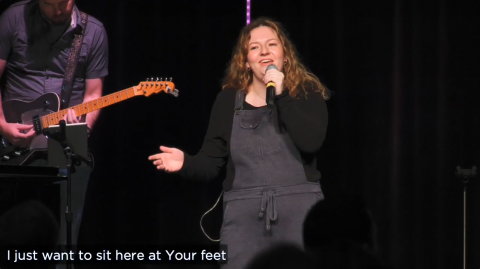Pastor Troy Murphy examined Jesus’ triumphal entry into Jerusalem on Palm Sunday at Community Church and unpacked the prophetic significance, as well as the practical application for us today. Listed below are key points, followed by discussion questions.
Prophecy fulfilled
Jesus’ path into Jerusalem (Luke 19: 28-44) is loaded with symbolic meaning and prophetic fulfillment.
-He comes out of Bethpage, which is known for its figs that represent goodness and gladness and sweetness. The last fruit or good thing coming into the nation of Israel was Jesus.
-His journey includes the Mount of Olives, where much of Jesus’ earthly ministry took place. It’s also where olives are crushed, which symbolizes where Jesus’ body would be crushed.
-He goes through the Kidron Valley, which symbolizes a dusky and gloomy area — the valley of the shadow of death.
-Riding a donkey is significant. The prophecy in Zechariah 9:9, written 500 years before, said: "See, your king comes to you, righteous and victorious, lowly and riding on a donkey..." A donkey is a symbol of peace — Jesus doesn’t order us to follow him but in humility asks us to trust him.
Practical applications
*Jesus enters into our lives in peace, rather than trying to win us over to faith by argument or force. The message of the gospel always comes in peace, not conflict or swords or violence or protests.
*While he comes in peace, Jesus flips the tables, as he did in the temple, to confront our hypocrisy. Context note: Jesus flipping the tables wasn't meant to condemn selling items at church. What was happening was people would bring their currency to exchange it for temple currency and were getting ripped off by temple leaders.
*We have a culture of blaming others and viewing the world as a bad place but fail to look at our own hearts. Before pointing a finger at others, Jesus needs to overturn some tables in your own life. If you think you’ve arrived spiritually, Jesus opens the doors to your life and exposes the hypocrisy. We need Jesus, in his love and peace and humility, to address our own hypocrisy.
*In 1 Corinthains 11: 23-26 we are reminded to take communion in order to remember what Jesus did for us. The table is set for us. Jesus wept when he entered the city of Jerusalem on Palm Sunday. He was thinking not just of the city, but about each one of us. He weeps over our sins but in the process is setting the table and giving us a way of redemption.
*Communion is not something you are doing for God or for a spiritual reset. We do it to remember that the God of the universe wants a relationship with us. He sent his son to set the table and provide us with a way out of our death sentence stemming from our sin.
*On Palm Sunday people put cloaks on the ground and waved palm branches as Jesus entered Jerusalem to celebrate. In the same way we shout “hosannah” and “the Messiah is here” when we take communion. Every time we take communion we are acknowledging our place at the table. We acknowledge the life and death and resurrection of Jesus that we need.
*Jesus invites you to his table. The story of Easter
Week is not about a distant land or memory. Every day is a treasure. Every day Jesus is alive. May our hearts be awakened this Easter week and come alive in the presence of Jesus. We have the opportunity to share a place at his table for eternity.
Discussion questions
Do you think you deserve a place at Jesus’ table? If so, what do you base it on? If not, why not?
What table does Jesus need to overturn in your life?
What are some ways we can eliminate hypocrisy?
What does communion mean to you personally?
What part of Easter Week is most special to you?



